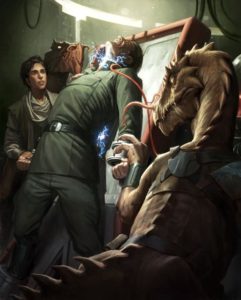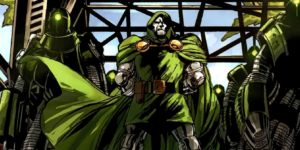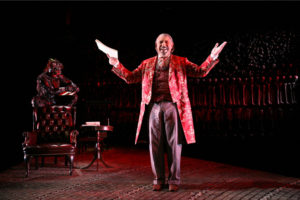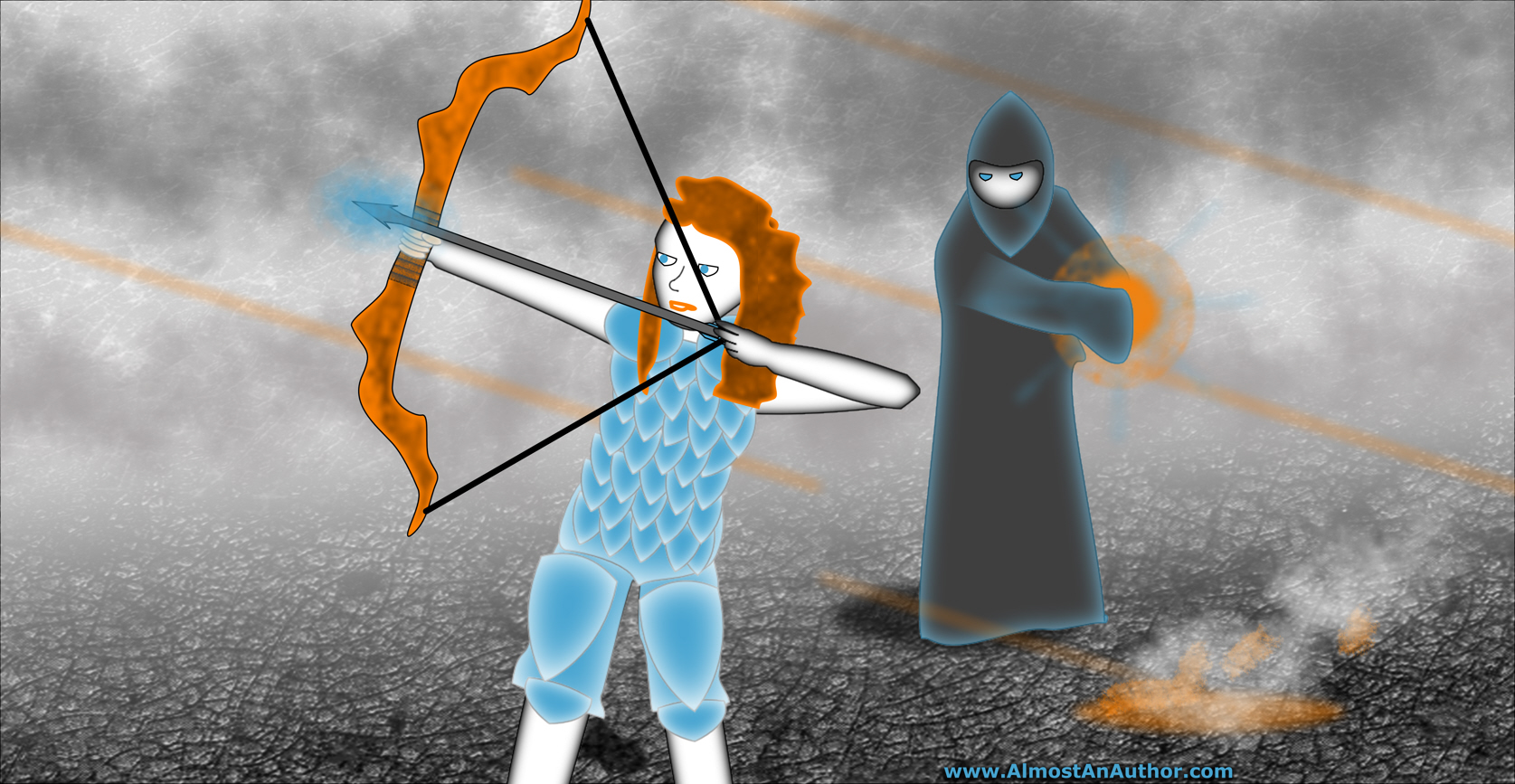If you’re writing a novel, you can’t do so without a healthy dose of tension. Whatever the protagonist’s goal is, your job as an author is to set up countless roadblocks between him and his prize. Maybe this means environmental disasters, conversational misunderstandings, simple mistakes, or physical limitations. But one of the most fun ways to torture your characters is with other characters. Specifically evil ones.
[bctt tweet=”But one of the most fun ways to torture your characters is with other characters.” via=”no”]
“Hold up,” you might say. As followers of Christ, our nature is (or at least should be!) to bring about peace, resolve conflict, and ultimately help people. Yes, but as a fiction writer, you need to delay this resolution as long as possible. And you can do this by creating compelling, evil characters. People who’d like to kill your heroes, take their stuff, steal the hearts of their loved ones, and burn everything else. And the nicer villains will do it in that order.
But how do you put these evil characters into your world convincingly? My suggestion would be to avoid any sort of “monolithic” evil. That essentially means evil for evil’s sake, something which no real human engages in. In fact, everyone pursues some form of good thing that God wants them to pursue. Happiness, sexual gratification, security, justice – these are all good things created by our loving creator for a specific purpose. But if an individual pursues them in a way that opposes God’s chosen method, that’s evil. And if the evil pursuit of these things happens to cross the path of your protagonist, well, all the better for your story.
Maybe the bad guy in your book has justice issues. The people that killed his wife were never brought before the law, and instead he feels the need to take matters into his own hands. He might attack policemen at random or devise some grander scheme to punish all of society. Or maybe his vengeance is very focused on an individual, but collateral damage affects the protagonist. Whatever the case, your antagonist should be fleshed out, and his evil motivations should be well-established. This is true regardless of your genre.
[bctt tweet=”Whatever the case, your antagonist should be fleshed out, and his evil motivations should be well-established.” via=”no”]
But in a speculative fiction novel, you may need to determine the motivations of an entire species. Why do the lizardmen in your book pillage and raid human villages? Is it to please their angry god? Or is it because they feel threatened by man’s expansion? Do the aliens invading earth intend to harvest humans for food? Or does human lymph tissue possess some life-saving cure for the alien homeworld? Their actions may be utterly depraved from our perspective, but an internally consistent reason for their behavior will do wonders to breathe sophistication into your novel.
Let’s take some examples. I just finished reading Kathy Tyers’ Truce at Bakura. It’s an older Star Wars novel, but it has enough unique storyworld elements that it really is set apart from the standard Star Wars fare. The antagonists in the book are the Ssi-ruuk, a reptilian race of creatures who desire to eradicate humans, and they are completely callous to the dying pleas of these men and women. This may seem heartless, but Tyers does a great job of crafting the aliens’ motivations. The Ssi-ruuk just want to bring peace to the universe by eliminating pests. And they don’t care about human suffering because they truly don’t believe humans have sentience. It is ironically similar to the way humans deal with unwanted insects in their home.
A real-world example of evil ideology would be communism. Yes, its cousin socialism is in vogue right now, but communism is possibly responsible for more deaths in the 20th century than any other movement. Between Russia and China alone, 21 to 70 million civilians were killed by their own countrymen, and that doesn’t even count Cambodia, Vietnam, or North Korea. To my conservative friends, this may sound like unadulterated evil. But remember that the communists weren’t killing their neighbors just because they enjoy killing. They truly believed they were bringing about a proletariat utopia, and were willing to go to great lengths to secure it. Yes, they committed murder, but in their minds they did so for an ostensibly noble purpose. Many still cling to the ideology because of the perceived good a Marxist world could theoretically bring – fairness, equality, and an end to excessive capitalist greed. Pursuing those ends isn’t bad, but communism always requires violent upheaval to get there. And that? That is evil.
It might be frightening to start crafting evil characters and worldviews in your novel. In fact, C.S. Lewis found the process incredibly taxing when writing the Screwtape Letters. But if you hope to create a rich storyworld with believable challenges to your protagonist, you’ll need to get inside the heads of your bad guys. This means trying to see from their perspective, which may be good practice to build empathy toward those with whom you disagree. But as a Christian writer, the important thing is to show that evil, no matter how powerful, clever, or prevalent, ultimately loses to Good.
[bctt tweet=”As a Christian writer, the important thing is to show that evil ultimately loses to Good.” via=”no”]
Dr. Doom Image from: http://screenrant.com/marvel-becoming-doctor-doom-hex-mortis/
Ssi-Ruuk image from: https://www.pinterest.com/pin/493636809132666309/
Max McLean as Screwtape, image from: https://fpatheatre.com/production/the-screwtape-letters/









3 Comments
Evil is definitely one of the harder subjects to consider. Questions like where did it come from, what is it doing, and how will it be conquered are key. I have had to put quite a lot of thought into the evil of my own book. Basically there is a force of evil and then the normal evil characters, like my antagonist. So far deciding exactly who the person of my antagonist would be has been difficult. I think when you drew the line between monolithic evil and more personal evil, that was a very good point. That idea has helped me examine my character and better flesh out that character.
Thanks Alex!
Timothy Zuehlke
Hi I wrote that article “Response to ‘communism killed 100 million people’ which you linked to and you totally used it wrong. The point of the article was not to justify these deaths happening but to argue that historians who say this are factually incorrect.
Thanks for commenting Brole! You’re right, the page I linked to does contest the fact that Communism has actively murdered 100 million. However, I never said Communism killed 100 million. I said 21 to 70 million. That’s pretty well-known and gives a pretty wide band around which people can disagree. As for the merits of communism versus capitalism, we can debate that elsewhere. You can friend me on Facebook – “Alex Shrum” and I have the same dashingly handsome profile picture I use here, haha – and I’d be glad to discuss it with you.
However, I must point out the greater scope of this article, and you’ll appreciate it. Specifically to give empathy to those with whom people disagree. Christian writers who see communism as a monolithic evil (which, right or wrong, is going to be the worldview of most of this audience), I have recommended that they try and understand why communists perceive their philosophy the way they do. That is why I linked to the COMMUNISTFTW site, because it makes the case for communism being good. I want my readers to understand alternate viewpoints before they try to write about them as one-dimensional or evil.